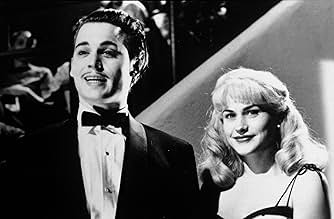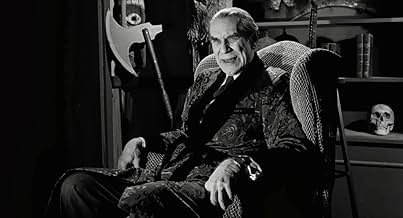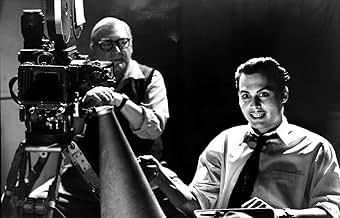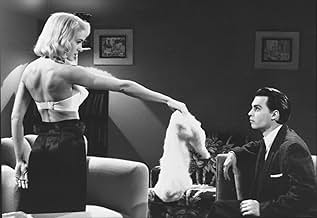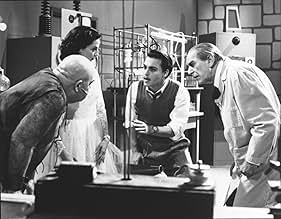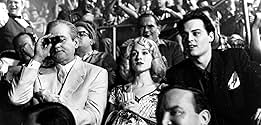Ambitious but troubled movie director Edward D. Wood Jr. tries his best to fulfill his dreams despite his lack of talent.Ambitious but troubled movie director Edward D. Wood Jr. tries his best to fulfill his dreams despite his lack of talent.Ambitious but troubled movie director Edward D. Wood Jr. tries his best to fulfill his dreams despite his lack of talent.
- Won 2 Oscars
- 27 wins & 33 nominations total
- Director
- Writers
- All cast & crew
- Production, box office & more at IMDbPro
Storyline
Did you know
- TriviaUnhappy with Vincent D'Onofrio's verbal impersonation of Orson Welles, Tim Burton had his voice dubbed by Maurice LaMarche.
- GoofsAccording to those who knew him, Bela Lugosi never used profanity.
- Quotes
Orson Welles: Visions are worth fighting for. Why spend your life making someone else's dreams?
- Crazy creditsThe movie ends with the simple line "Filmed in Hollywood, USA", the same way the real Edward D. Wood Jr. did it at the end of his movies.
- SoundtracksBunny Hop
Written by Ray Anthony and Leonard Auletti
Performed by John Keating
Courtesy of Gateway Records
Featured review
I am a Johnny Depp fan, and this film only reinforced my enjoyment of his genuine talent. He's whatcha call a real actor. He's on record ("Inside the Actor's Studio" & elsewhere) as saying that his characterization of Wood was a mixture of "the blind optimism of Ronald Reagan, the enthusiasm of the Tin Man from 'The Wizard of Oz' (1939) and Casey Kasem." Well, I must add that either he left out channeling Jon Lovitz or that's where Lovitz got his inspiration, too. It is at moments positively eerie how well it works, and without feeling like Depp stole Lovitz's act--his overall character is so much more, so much else, that the Lovitz echo becomes a small part of a larger coherent whole, although it never disappears entirely.
Sarah Jessica Parker and Patricia Arquette as the principal women in Wood's life are each endearing and effective in their own separate ways. Bill Murray is fun as always, and the secondary and bit players are very well cast.
Martin Landau . . . well . . . Martin Landau simply left me awestruck. Depp is all over the screen doin' his best wacky movie guy and chewing the scenery, Parker, Arquette, Murray, and the rest are obviously having a real fun time backing him up, and Martin Landau is shuffling around in the foreground muttering in Romanian and writing a book called "How to Steal a Movie." Mind boggling performance, and absolutely deserving every award it got him in 1995, which included a Best Supporting Actor Oscar, Golden Globe and SAG Awards, and the American Comedy Award for Funniest Supporting Actor in a Motion Picture. (Incidentally, his daughter Juliet, better known to millions of Buffy the Vampire Slayer fans as the vampire Drusilla, is one of the supporting players.)
If I weren't already a Tim Burton fan this movie would have made me one. He here makes an almost perfectly crafted period piece (anachronisms noted--see the "goofs" page--and dismissed), half cheesy fake scifi B movie and half period noir thriller, as a cinematic biography about the quintessential cheesy fake noir scifi thriller B movie guy. This film goes beyond pastiche, and beyond homage to a genre, although it is both. With this film Burton genuflects--no, prostrates himself--before the gods of 1950s low-budget black and white, and the gods are pleased indeed. It seems like he must have watched every movie made in America for under a million dollars between 1948 and 1962. I lost count of the echoes and parodies and pastiches and mini-homages that fill, I think, every darn frame of the movie, and which by no means are mostly of Wood and his work.
As with, I think, every movie biography, there's the odd gratuitous fact changing (see the "goofs" page again)--you know, the "Why'd they do that when the truth wouldn't make any difference?" kind of stuff, and as glowing as this review obviously is I must also say that it is in some ways an imperfect film--it glosses over Wood's later career, for example. But it it so obviously a labor of love and joy for all involved that in my opinion its imperfections are inconsequential. Ed Wood stands proudly, with that slightly odd gleam in its eye, with the best movie biographies made.
Sarah Jessica Parker and Patricia Arquette as the principal women in Wood's life are each endearing and effective in their own separate ways. Bill Murray is fun as always, and the secondary and bit players are very well cast.
Martin Landau . . . well . . . Martin Landau simply left me awestruck. Depp is all over the screen doin' his best wacky movie guy and chewing the scenery, Parker, Arquette, Murray, and the rest are obviously having a real fun time backing him up, and Martin Landau is shuffling around in the foreground muttering in Romanian and writing a book called "How to Steal a Movie." Mind boggling performance, and absolutely deserving every award it got him in 1995, which included a Best Supporting Actor Oscar, Golden Globe and SAG Awards, and the American Comedy Award for Funniest Supporting Actor in a Motion Picture. (Incidentally, his daughter Juliet, better known to millions of Buffy the Vampire Slayer fans as the vampire Drusilla, is one of the supporting players.)
If I weren't already a Tim Burton fan this movie would have made me one. He here makes an almost perfectly crafted period piece (anachronisms noted--see the "goofs" page--and dismissed), half cheesy fake scifi B movie and half period noir thriller, as a cinematic biography about the quintessential cheesy fake noir scifi thriller B movie guy. This film goes beyond pastiche, and beyond homage to a genre, although it is both. With this film Burton genuflects--no, prostrates himself--before the gods of 1950s low-budget black and white, and the gods are pleased indeed. It seems like he must have watched every movie made in America for under a million dollars between 1948 and 1962. I lost count of the echoes and parodies and pastiches and mini-homages that fill, I think, every darn frame of the movie, and which by no means are mostly of Wood and his work.
As with, I think, every movie biography, there's the odd gratuitous fact changing (see the "goofs" page again)--you know, the "Why'd they do that when the truth wouldn't make any difference?" kind of stuff, and as glowing as this review obviously is I must also say that it is in some ways an imperfect film--it glosses over Wood's later career, for example. But it it so obviously a labor of love and joy for all involved that in my opinion its imperfections are inconsequential. Ed Wood stands proudly, with that slightly odd gleam in its eye, with the best movie biographies made.
Details
- Release date
- Country of origin
- Language
- Also known as
- Kẻ Bất Tài
- Filming locations
- Production companies
- See more company credits at IMDbPro
Box office
- Budget
- $18,000,000 (estimated)
- Gross US & Canada
- $5,887,457
- Opening weekend US & Canada
- $71,566
- Oct 2, 1994
- Gross worldwide
- $5,888,045
- Runtime2 hours 7 minutes
- Color
- Sound mix
- Aspect ratio
- 1.85 : 1
Contribute to this page
Suggest an edit or add missing content







